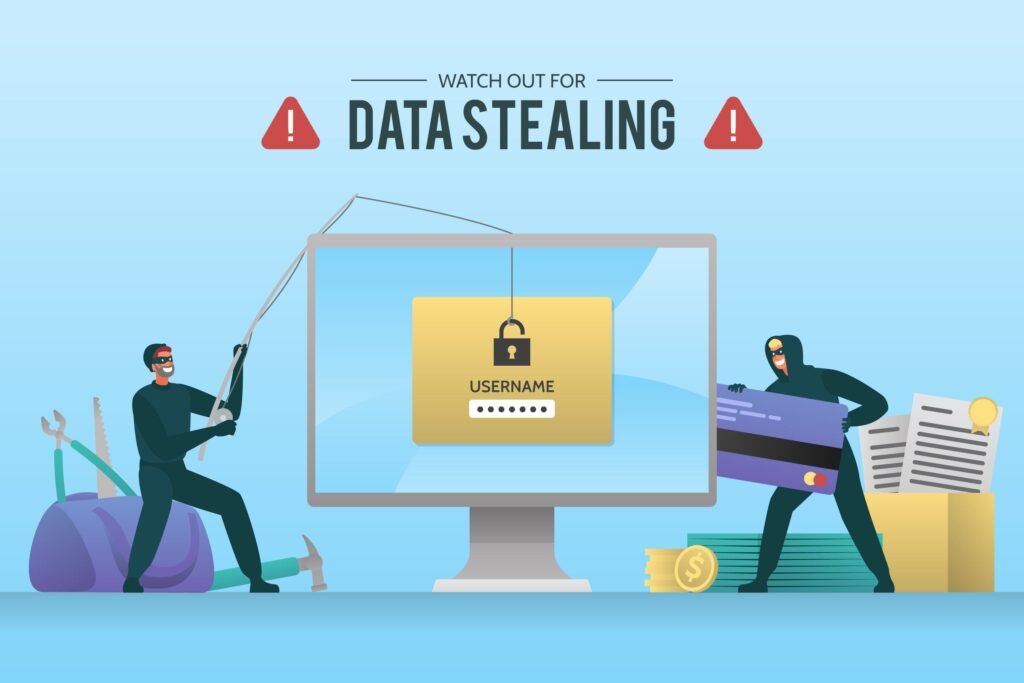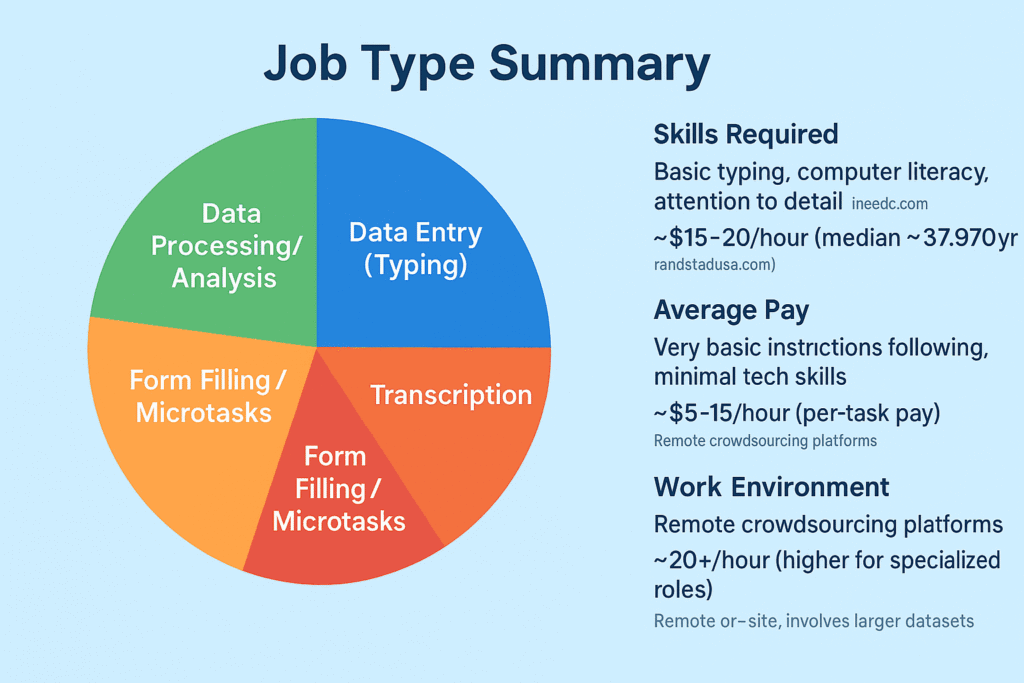
Data Entry Jobs Without Investment: Real or Fake?
The idea of easy, no-investment work from home can be tempting. Searching for “data entry jobs without investment” often turns up ads promising high pay for minimal effort. But are these opportunities legit, or just clever scams? Unfortunately, many fraudsters impersonate real companies (Amazon, Intuit, etc.) on legitimate platforms like ZipRecruiter or LinkedIn. They may even conduct “interviews” via text or WhatsApp to seem authenticconsumer.ftc.gov. In reality, these schemes often aim to steal your personal data or money. In this post, we dive deep into the truth behind no-fee data entry work – explaining its appeal, types of jobs, warning signs of scams, and how to find legitimate platforms for real data entry gigs.
The Appeal of Data Entry Jobs Without Investment
Data entry work attracts people who need flexibility and have basic computer skills. Since many roles are entry-level, virtually anyone – students, stay-at-home parents, retirees – can try them. Indeed notes that “most data entry jobs are entry-level positions requiring minimum qualifications”indeed.com, which means little to no specialized training is needed. For example, a parent looking for stay-at-home work can often learn data entry on the job; FlexJobs highlights data entry as “a solid option” requiring only basic typing and computer skillsflexjobs.com. No formal degree or certification is typically necessary.

Many people search for “jobs without investment” because they cannot afford to pay upfront fees or buy expensive equipment. Legitimate data entry jobs usually require no upfront payment – you just need a computer, internet, and sometimes a pay-per-click or pay-per-task platform account. This low barrier to entry explains the appeal. The promise of flexible hours, remote work, and easy entry (few skill requirements) leads many to try data entry gigs. In short, the idea is real: data entry work does exist and is used by many as a side income source. However, the catch is that genuine openings are often scarce, and scammers take advantage of the demand by posting fake ads.
Understanding the Types of Data Entry Jobs
“Data entry” can cover a variety of tasks. Below are common categories of legitimate data-related work:
- General Data Entry / Typing Work: Inputting text or numbers into spreadsheets or databases (e.g. transcribing handwritten forms, entering customer information). Skills needed are basic computer and typing skills, attention to detail, and sometimes familiarity with software like Excel.
- Transcription: Listening to audio (interviews, lectures, meetings) and typing it out word-for-word. This requires fast, accurate typing and good language/listening skills.
- Form Filling / Microtasks: Completing online surveys or filling web forms with provided information. These are often one-off tasks with very low pay (a few dollars each) but require minimal skills.
- Data Processing / Analysis: Cleaning and organizing datasets, performing simple analyses, or generating reports. This demands knowledge of spreadsheets or databases and some analytical ability.

Each of these can be done remotely and on a freelance basis, though pay and skill levels vary. Below is a summary of these job types:
| Job Type | Skills Required | Average Pay | Work Environment |
|---|---|---|---|
| Data Entry (Typing) | Basic typing, computer literacy, attention to detailindeed.com | ~$15–20/hour (median ~$37,970/yrrandstadusa.com) | Work-from-home or office, full-/part-time |
| Transcription | Fast, accurate typing; excellent listening and language skills | ~$19–30/hourtranscriptioncertificationinstitute.org | Usually remote, project-based |
| Form Filling / Microtasks | Very basic instructions following, minimal tech skills | ~$5–15/hour (per-task pay) | Remote crowdsourcing platforms |
| Data Processing/Analysis | Excel/DB skills, analytical mindset, data accuracy | ~$20+/hour (higher for specialized roles) | Remote or on-site, involves larger datasets |
Many data entry tasks overlap with data processing: for example, Amazon MTurk describes HITs (Human Intelligence Tasks) like “data processing” and “analysis challenges” that workers handlemturk.com. In practice, some roles may blend simple transcription with light analysis (e.g. categorizing data, generating charts), so familiarity with spreadsheets or analytics can be a plus. Overall, legitimate data-entry work tends to be repetitive and detail-oriented, often supporting larger business functions (like databases, surveys, bookkeeping).

Spotting the Red Flags: How Scams Work
While real data entry jobs exist, scammers abound. They use several telltale tactics to lure victims:
- Upfront Fees or “Training” Costs: Any job asking you to pay money (for software, training, or equipment) is almost certainly fakeconsumer.ftc.govindeed.com. Legitimate employers never require new hires to pay for the privilege of working. For instance, the FTC emphatically warns: “Never pay for a job or equipment”; honest employers won’t ask you to send money up frontconsumer.ftc.gov.
- Unrealistic Pay Promises: Be wary of ads offering extremely high pay for minimal work. For example, LinkedIn cautions that job offers promising “high-paying job with little work” after just one interview are almost never legitimatestaysafeonline.org. Common scams promise $200–$500/day for 1 hour of data entry; if it sounds too good to be true, it is.
- No Verifiable Employer Info: Scammers often hide behind no-name companies or impersonate real ones. They might claim to be from major brands (Amazon, Intuit, etc.) but use generic email addresses or messaging apps like WhatsApp. Always verify by calling the company’s official number. The National Cybersecurity Alliance advises checking that job listings appear on an employer’s official site and not entering info on a “spoofed” pagestaysafeonline.org.
- Unsolicited Contact & Urgency: If you receive an unsolicited offer (especially via Facebook, Telegram, email, or text) and they push you to act quickly, be suspicious. Scammers may conduct a quick online “interview” over Zoom or chat and then immediately send an “official” job offer – often within a day or two. Remember, a real job process takes time. The BBB study notes victims were often hired by video call and told they start immediately – then asked to buy gift cards or equipmentbbb.org.
- Fake Check/Gift Card Scams: A classic is the fake-check trick. Scammers send you a counterfeit check (say $2,000) asking you to deposit it and send back some of the money via gift cards or wire. Eventually the check bounces and you are out thousands. The BBB recounts one case: a victim was told to deposit a $2,400 check and purchase $2,400 in gift cards for “equipment” – but the check turned out fraudulent, leaving her with a $4,800 lossbbb.org. Always verify any payment by contacting the issuing bank.
- No Contract or Paperwork: If the “employer” is vague and won’t provide a written contract or sends only scribbled PDF offer letters, consider it a red flag. Legitimate firms will have formal onboarding processes. Indeed’s advice: ask for a signed employment contract; unwillingness to provide one is a big warning signindeed.com.

In summary, any job that requires you to pay upfront, promises unbelievably fast riches, or has shady communication (no email domain, demands on messaging apps, etc.) is likely a scamconsumer.ftc.govindeed.com. Common patterns include: “free training” fees, requirement to buy software/tools, requests to share personal ID info (beyond what’s normal), or moving conversation off public job sites. Always err on the side of caution.
Legitimate Data Entry Platforms
If you’re seeking real data entry work, stick with established platforms where no investment is needed. Here are some reputable options:
- Upwork – A huge global freelancing marketplace connecting businesses with contractors. You sign up for free, create a profile showcasing your data-entry skills (speed, tools known, etc.), and submit proposals to posted jobs. Upwork does not charge for membership; they take a percentage of your earnings after you complete work. To succeed, build a strong profile with samples, bid competitively, and gather good client reviews over time. (Upwork reports data entry specialists typically charge around $10–$20/hr.) Payment is secured through Upwork’s escrow system.
- Freelancer.com – Similar to Upwork, Freelancer lets you browse thousands of projects. You bid on data entry jobs by competing with other freelancers. No upfront fees to join, though you may pay for additional “bids” or premium membership later. Always check the employer’s profile and feedback. Watch out for lowball jobs; quality clients pay fair rates (often comparable to Upwork).
- Clickworker – A micro-task platform focusing on short jobs (“microtasks”) like text transcription, data labeling, and form entry. Workers sign up as “clickworkers” on Clickworker’s site or app. Tasks pay per piece (often just cents for a few minutes of work). For example, one review notes most Clickworker tasks pay $0.02–$7.00 eachsidehustlenation.com. While not lucrative, it’s legitimate – you perform tasks assigned in the platform and get paid (via PayPal or other methods) weekly for approved work. Clickworker is legit: it explicitly offers “short tasks” like data entry or surveyssidehustlenation.com.
- Amazon Mechanical Turk (MTurk) – A crowdsourcing platform by Amazon for “Human Intelligence Tasks.” MTurk provides thousands of small HITs such as transcription snippets, data cleaning, or surveys. To sign up, you need an Amazon account. Pay is small (often just pennies per task), but real. Amazon describes MTurk as “help[ing] Requesters solve data processing, analysis, and content moderation challenges”mturk.com. Be patient and selective to maximize earnings.
- Other Sites: You can also consider freelance sites like Fiverr or PeoplePerHour, where you create “gigs” for data entry at set prices. Specialized sites like Rev or TranscribeMe are for transcription jobs specifically (they provide audio to transcribe). Just avoid any site that asks for money to join or “certify” you.

All these platforms share a key feature: no upfront investment is required. You only get paid after completing work. Always sign up via the official website, complete your profile thoroughly, and start with smaller tasks/projects to build reputation. According to industry data, a U.S. data entry clerk earns a median ~$37,970 per year (about $18.26/hrrandstadusa.com), though freelancers may charge $10–$20/hr on average. Always negotiate fair rates, but also beware of offers that seem absurdly high.
Voices from the Field: Real Experiences
Consider these illustrative stories from hypothetical workers:
- Success Story: Aisha, a college student, wanted a part-time remote job. She joined Upwork and listed her data entry skills. In the beginning she bid on small gigs (like entering survey data) and worked for modest pay. Over a few months, Aisha built up five-star reviews. Eventually she landed a steady transcription project that pays about $15/hour. Aisha never paid anything to get hired; she researched each client and always used Upwork’s platform for contracts and payment. Her advice: “Be patient, fill out your profile completely, and start small. Real opportunities do exist on these sites.”
- Cautionary Tale: Ravi saw a Facebook ad for “Data Entry Pro INC,” promising $1,200/week for a few hours of work. He applied and was told he was hired immediately. However, they required him to “purchase a training pack” for $99. When Ravi paid by gift card, the communication suddenly stopped. He later learned this was a scam – a fake company used his money and vanished. Fortunately, he lost only $99. Ravi now tells friends: “If anyone asks me to pay before I even start, I walk away.”
- Another Warning: Priya, a retiree on a tight budget, responded to an online job board listing for a “remote customer support” role paying $24/hr. After a quick video chat, she was hired and received a $2,400 check with instructions to buy office equipment (gift cards) and email her “manager” the receipt codes. Sensing something was wrong, Priya contacted her bank first. The bank confirmed the check was counterfeit. Priya had been nearly tricked into a gift-card scam like the one described by the BBBbbb.org. She now emphasizes: “Always verify before acting on any job offer.”

These stories (based on real-world patterns) underscore the range of experiences: some find genuine gigs on freelancer platforms, while others fall prey to scams. Your own experience can vary widely depending on the sources you use and the caution you take.
Expert Tips to Stay Safe and Succeed
Veteran job coaches and security experts offer clear advice:
- Research the Employer: Before applying, google the company name plus “scam” or “reviews.” Ensure the job ad appears on official websites or well-known job boards. Cybersecurity authorities advise verifying a listing through the company’s actual domain, not just a search resultstaysafeonline.org. If something feels off (strange email address, non-corporate email), contact the company using contact details from its legitimate site.
- Never Pay Upfront: Employers will never ask you to pay them. The National Cybersecurity Alliance bluntly warns: “If any job posting describes sending checks, money orders, or prepaid cards, fraud will likely occur”staysafeonline.org. Likewise, Indeed’s career experts warn against any “initial investment” requestindeed.com. If asked to buy anything or pay fees, decline immediately.
- Protect Your Personal Information: Legit companies only collect sensitive info (SSN, bank account) after formal hiring and contract signingstaysafeonline.org. Until then, share only the minimum (email address, resume info). Consider using a separate email and phone number for job hunting, as the Alliance suggestsstaysafeonline.org. Think of your personal data “like cash” – guard it until you’re certain of the employer’s identity.
- Verify Payment Methods: For freelance platforms, use built-in payment systems (e.g. Upwork’s escrow, PayPal, etc.), which offer some protection. Be skeptical of any client who insists on using an unusual method (like wire transfer without escrow). If you do receive a check, don’t spend the funds until you’re sure it’s valid (contact the bank).
- Watch for Rapid Hires: Real jobs usually require interviews and background checks. If someone tries to hire you after one video call, especially promising instant work and pay, be extremely cautiousstaysafeonline.org. Take time to review details and get everything in writing.
- Use Reputable Sites: Stick to well-known platforms (Upwork, Freelancer, LinkedIn, legitimate agencies). These sites often vet employers. For example, LinkedIn and Indeed filter out many scam listings, and they encourage reporting suspicious ads.
- Trust Your Instincts: If a job posting or recruiter makes you uncomfortable or pressures you, exit and research. It’s better to miss a “quick” opportunity than fall victim to fraud.

Do’s & Don’ts of Data Entry Job Hunting:
| ✅ DO | ❌ DON’T |
|---|---|
| Research each company and job postingstaysafeonline.org | Pay any money for “job training”consumer.ftc.gov |
| Use trusted freelancing platforms (Upwork, etc.) | Trust offers with guaranteed huge pay |
| Verify job offers through official channelsstaysafeonline.org | Communicate only via unsecured chat apps |
| Share personal info only after hiring (contract signed)staysafeonline.org | Provide SSN/bank info upfront |
| Report suspicious listings to the site or authorities | Ignore red flags like typos or vague emails |
Following these tips can help you stay safe and legitimate. Remember the core rule: legitimate employers don’t ask you to pay them. By focusing on established platforms and using common sense, you can build real income opportunities while avoiding pitfalls.
Conclusion
So, are data entry jobs without investment real or fake? The answer is: both. Real, no-fee data entry roles do exist, but they are limited and competitive. Scammers have flooded the internet with fake listings exploiting the popularity of such jobs. As the FTC and BBB caution, many “too good to be true” offers are outright scamsconsumer.ftc.govbbb.org. However, by using proven freelancing sites and crowdsourcing platforms (Upwork, Freelancer, Clickworker, MTurk, etc.), you can find genuine projects that require no upfront cost. Always do your homework: verify the employer, read reviews, and never send money. As one expert puts it, treat personal info “like cash” and never invest in a job until you’re certain it’s legitimatestaysafeonline.orgstaysafeonline.org.

Ultimately, due diligence is key. If a data-entry listing seems suspicious (big pay, vague company, investment required), walk away. Conversely, legitimate jobs will appear through credible channels. By staying informed and cautious, you can turn data entry into a real source of income – but never lose sight of those warning signs.
Call to Action
Have you tried a data entry gig (either for good or ill)? Share your experiences in the comments below! If you found this guide helpful, please share it with friends or on social media. Don’t forget to subscribe for more tips on finding safe work-from-home opportunities. Stay informed, stay vigilant, and explore our other blog posts on remote job hunting and career advice for further insights.




hi sir i creat this blog
Hey! Just checked out codeqq88, and honestly, it’s pretty solid. Found some interesting stuff there. Definitely worth a look if you’re looking for something new. Check it out: codeqq88
Dragonhatchvn looks interesting. I’m a sucker for those Asian-themed slots! Going to give them a spin later. Good luck to us all! dragonhatchvn